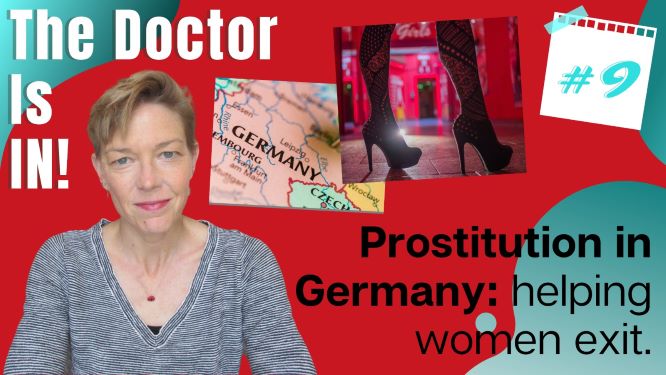
For this webinar I interviewed my colleague Rhonda who is the director of an organization that helps women exit prostitution in Germany. I think you’ll get much more from the video interview, but here I provide a summary and paraphrasing of our conversation with some bonus links. I’m sure you will learn a lot from her experience and wisdom.
My first question to Rhonda was, “Why do these women need help leaving prostitution?” Prostitution is legal, so aren’t conditions there better for the women? Are the women you help victims of trafficking? Otherwise, why don’t they just leave?
Prostitution and sex trafficking are linked but are not the same thing. Women helped by her organization are often forced into prostitution, but not necessarily trafficked, although some are. Most are from Eastern Europe and therefore have the right to travel and work in Germany. However, the situation is often complicated because, although it is the law, the women are often not registered as “sex workers” in Germany. (It is estimated that there are around 300,000 – 400,000 sex workers in Germany, of which only 33,000 are registered, but Germany does not collect rigorous data on this.) Women from Eastern Europe do not know the system of how to get registered and do not have the requisite documents such as a social security number, housing certificate, or a bank account. Furthermore, even though prostitution is legal, there is a stigma to doing sex work and they do not want that on their permanent record.
Often the women come under coercion from loverboy boyfriends/pimps. Also, because they don’t have the language and usually a low education level, it is very difficult to navigate the German bureaucracy. When the women want to leave, they have very few options and returning home can be dangerous. Without a knowledgeable, patient, and competent social worker, these women fall through the cracks of society, often leaving children behind.
How have the pandemic restrictions impacted the women’s’ lives and your ability to do your work?
Due to the pandemic restrictions and closure of the brothels, her organization has seen increased destitution, homelessness (because they are kicked out of the now closed brothels), hunger, and exposure to violence. The women are also subject to fines for prostitution, even if they are selling sex for survival. However, Berlin has passed a law that absolves the women of fines, while the johns are still subject to fines.
Many of these women are now eligible (due to special COVID funds) for governmental social help, but the women don’t know this and even some government workers don’t know this. The social workers have had to send copies of the law to the government agency workers to advocate for the women requesting assistance.

Has there been a change in the conversation regarding the legalization of prostitution in Germany?
There is a lot of talk now between the various groups who have different opinions about the legal state of prostitution in Germany. Some groups are advocating for the Nordic Model, which criminalizes buying sex but not selling it. These groups are seizing this opportunity because the pandemic restrictions have revealed the plight of most of the women in prostitution who are not German, who are not registered, and who are not receiving assistance because most prostitution is actually happening in illegal spaces, not legal ones. These are the groups that got Berlin to change their laws in fining johns and not prostitutes. The Nordic Model will need modifications to work in Germany, but the basic premise is solid. At 13:30 in the video listen to Rhonda describe Germany’s “Bio Toilets” solution for prostitution.
What are some of the main physical and mental health problems that you see in the women?
The women experience all sorts of physical health consequences such as gastrointestinal problems, headaches, sexually transmitted infections, and many physical problems such as chronic pain that are trauma-based. Mental health problems are very common and include fear, paranoia, mood disorders, and other complex problems related to complicated trauma histories. She notes that the physical problems are intertwined with the mental issues and healing is linked to a holistic approach that most doctors and health systems do not understand. Furthermore, the women have a horrible fear of doctors and hospitals and it is tough to get them to show up for appointments. It takes patient social workers to accompany them to these appointments.

I asked Rhonda to share some words of wisdom for those who want to get involved in working against sexual exploitation and trafficking.
Be informed – there is plenty of information out there. Understand the situation of human trafficking in your geographical area and learn the specific needs of the organizations there. Understand your own strengths and the skills you have to offer and get involved. Be realistic about your capacity for involvement. Do not over-commit. When you are looking to financially support organizations, do your due diligence in finding organizations doing ethical and trauma-informed work. Everyone can be involved in prevention – being a safe person and a strong helper to reduced vulnerabilities to being trafficked and exploited in the first place. (Plug: Here is my blog on prevention) Finally, she stressed that we must understand that transition out of an exploitative or trafficked situation is a long process where the women will be in and out of contact. Also, it can take years and several false starts for people to leave and be 100% out of that situation.
Rhonda shared about their organization’s transition from residential after care to a community-based assistance.
Originally, her organization started with a safe house and fully inclusive residential program. They found that the restrictive environment was not appealing to the women and they would leave after 1-3 months, and generally be lost to follow up. In the last year, they moved to a community-based assistance program where most of the women are still in prostitution but have a desire to exit. They meet them where they are and work on the exit process step by step. The social workers help them realize the woman’s own strengths and resources. Based on their own dreams, they help empower them to reach their goals. The women want to exit on their own terms and the team is there to help them achieve their goals and walk with them through it. (Plug: see my post on strengths-based interventions) This is true empowerment.
Thank you Rhonda and your staff for all the hard work you do and thanks for taking the time to join me for this conversation!

Recent Comments